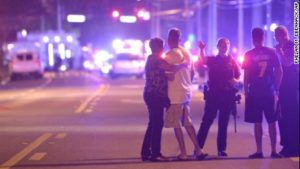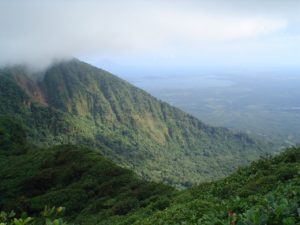I am the child of an immigrant. My mom is from El Salvador, so I grew up with the tastes and influences of a typical American teenager, all mixed with a strong awareness of Latino culture and history. I’m pretty grateful for the combo.
You know who else is the child of an immigrant? Omar Mateen, the psychopath who murdered 49 people in Orlando a few nights ago.
Mateen and I clearly had different interpretations of the dichotomies that come with being members of the first generation to be born in America. For example, I blended a love of hamburgers with an appreciation for pupusas, and I gave the music of my mother’s homeland a fair listen before popping in a Soundgarden album. It was a bit of a mezcla.
But Omar Mateen wasn’t interested in mixing cultures. He found it easier to just embrace the problems, prejudices, and anger of his parents’ country. Mateen latched onto his father’s homophobia and the religious mania that is widespread in his family’s homeland. And in so doing, he set out to be more culturally authentic than his parents ever were.
This is not an issue of assimilation or integration, as so many people believe it to be. No, it is more of a cultural mindset.
It is a mindset that provokes young men, born and raised in America, to adopt the radical politics of their parents’ homelands. It is a mindset of fear and fury.
The massacre in Orlando — and the fact that so many of the victims were Latino — got me thinking about how this cultural perception forms one of the many roots of bigotry and violence.
Let’s ask, why are there no Latino terrorists, going on shooting sprees or strapping on bombs to avenge the pain and misery that the United States government has inflicted upon El Salvador, Nicaragua, Honduras, and other Latin American countries?
Indeed, there is ample reason for Hispanics to be more than a little pissed about our treatment and standing in the United States.
And yet, survey after survey shows that Latinos are more optimistic about the future and more positive about life in general than just about any other American demographic. We are pretty much the last people to use the injustices of the past to justify abhorrent behavior.
One reason for this is so obvious that it borders on the simplistic. But here it is: Latinos tend to look forward.
We pack up and move to new countries in search of better lives. We assume our kids will do better than us. We have faith that circumstances will improve.
And this forward-thinking mindset, this cultural tendency to dismiss the woes of the past, helps us to maintain optimism in the face of economic and political tribulations. It helps us to set aside our pain and disappointment, rather than hoist them upon our backs for all to see.
In contrast, angry and hate-filled people tend to look backward, toward some vague past, and then they threaten to make America, you know, “great again.”
And other people, like Omar Mateen, not only look backward — they glare at it with a white-hot obsession and rage. They believe that their culture’s best days are long behind them, that the present holds nothing more than humiliation and despair, and that someone — maybe American society or gays or left-handed dentists or whoever — is to blame.
Omar Mateen, in addition to being a pathetic and homicidal loser, was an unimaginative, scared person who had no faith in the future. And someone taught him that mindset, inculcating him with the belief that it was reality.
As for his victims — people with names like Almodovar and Guerrero and Rios and Flores — they most likely had great hopes for tomorrow and next year and the next decade. But that optimism and those dreams were cruelly taken from them by a furious man who could do nothing better with his life than stare backward into the distant past.






